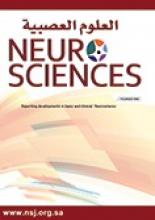Abstract
OBJECTIVE: To investigate the role of 2 angiogenic/neurogenic growth factors, vascular endothelial growth factor (VEGF), and platelet-derived growth factor (PDGF) in Saudi children with autism.
METHODS: The study included a total of 60 children that included 20 controls and 40 patients with a confirmed diagnosis of autism. The study was conducted in the Department of Physiology, Faculty of Medicine, King Saud University, and in the Autism Research and Treatment Center, King Khalid University Hospital, Riyadh, Kingdom of Saudi Arabia between May 2010 and April 2011. Collected blood plasma samples were analyzed for VEGF and PDGF.
RESULTS: The levels of VEGF showed a non-significant change in autistic children compared with the control children (p=0.065). The levels of PDGF were significantly higher in autistic children compared with the control children (p=0.01). Furthermore, this increase was significantly more pronounced in children with severe autism as compared with children with mild autism (p=0.001), and it was not correlated to the severity of the disorder.
CONCLUSION: A rise in PDGF may contribute to the pathophysiology of the disorder, either alone or in synergy with other neurotrophic factors to induce an angiogenic-neuroprotective effect. Plasma VEGF has no causative or compensatory contribution to the pathology of this disorder.
- Copyright: © Neurosciences
Neurosciences is an Open Access journal and articles published are distributed under the terms of the Creative Commons Attribution-NonCommercial License (CC BY-NC). Readers may copy, distribute, and display the work for non-commercial purposes with the proper citation of the original work.






